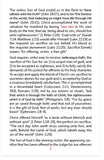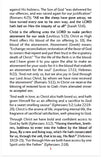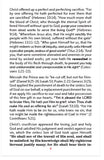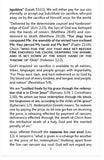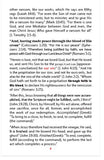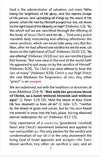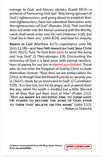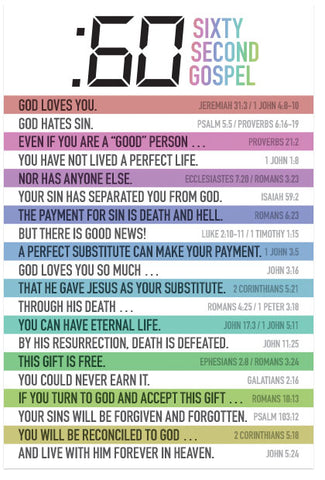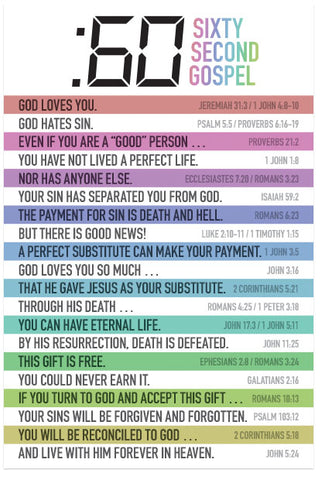God's Required Sin Sacrifice
Special-Order Folded Tract
 NOTE: This item is custom-printed to order (click for more details).
NOTE: This item is custom-printed to order (click for more details).
This tract is from our print-on-demand library, and is not kept in stock. Select the options below, and we will custom-print a batch just for you. Because this item is custom-printed, you can add your custom imprint to the back page at no extra cost.
- Estimated shipping date: Thursday, March 26 (Click for more details)
- SKU:
- Discounts: Discount coupons do not apply to this item
- Format: Folded Tract
- Size: 3.5 inches x 5.5 inches
- Pages: 8
- Imprinting: Available with 5 lines of custom text
- Version: KJV
- Returns: Because this item is custom-printed to order, it cannot be returned.
Show all item details
The full text of this tract is shown below in the KJV version. (Do you want to print this tract in a different version than the one listed? Contact us and let us know what you're looking for—we may be able to create the alternate version for you at no charge.)
The sinless Son of God visited us in the flesh to “bear witness unto the truth” (John 18:37), and to be “the Saviour of the world, that believing ye might have life through His name” (John 20:31). Christ accomplished the work of salvation for mankind by baring “our sins in His own body on the tree, that we, being dead to sins, should live unto righteousness” (1 Peter 2:24). “God with us” (Isaiah 7:14; Matthew 1:23) would offer Himself (Luke 22:19) as the required sin sacrifice on our behalf, His blood as the required atonement (Luke 22:20). Sacrifice (Greek) means “An offering, victim, a free gift.”
God requires sinful man to receive, believing in faith, the sacrifice of His Son for sin 1) to acquit man of guilt, and 2) to be accepted as righteous, and 3) to fully satisfy the demands of His justice for affronts to His holy character. To accept and apply the blood of Christ’s sin sacrifice to ourselves atones for our guilt and is accepted by God as a vicarious [mediated] satisfaction. This is accomplished in a circumcised heart (Colossians 2:11; Deuteronomy 30:6; Romans 2:29), not by our actions or rituals, “but that which is through the faith of Christ, the righteousness which is of God by faith” (Philippians 3:9). “For by grace are ye saved through faith; and that not of yourselves: it is the gift of God: Not of works, lest any man should boast” (Ephesians 2:8-9).
Christ offered Himself “as a lamb without blemish and without spot” (1 Peter 1:18-19), the perfect sin sacrifice. “The next day John seeth Jesus coming unto him, and saith, Behold the Lamb of God, which taketh away the sin of the world” (John 1:29).
The Son of God is the atoning victim, the appeasing sacrifice that has been offered to the Judge for our offenses against His holiness. The Son of God “was delivered for our offences, and was raised again for our justification” (Romans 4:25). “All we like sheep have gone astray; we have turned every one to his own way; and the LORD hath laid on Him the iniquity of us all” (Isaiah 53:6).
Christ is the offering unto the LORD to make perfect atonement for our souls (Leviticus 5:15). Christ as High Priest offers His blood of the sin offering (v. 10), the blood of the atonement. Atonement (Greek) means “Exchange; reconciliation; restoration of the favor of God to sinners that repent and put their trust in the expiatory death of Christ.” “For the life of the flesh is in the blood: and I have given it to you upon the altar to make an atonement for your souls: for it is the blood that maketh an atonement for the soul” (Leviticus 17:11; Hebrews 9:22). “And not only so, but we also joy in God through our Lord Jesus Christ, by whom we have now received the atonement” (Romans 5:11). In Christ we receive the blessing of restored favor to God—from alienated sinner to accepted son.
“And walk in love, as Christ also hath loved us, and hath given Himself for us an offering and a sacrifice to God for a sweet smelling savour” (Ephesians 5:2; Luke 22:19-20). Christ is the aroma of life, imparting eternal life, the fragrance of sacrificial satisfaction, well-pleasing to God.
Through Christ we have bold and confident access to God by faith (Ephesians 3:12). “Having therefore, brethren, boldness to enter into the holiest by the blood of Jesus, By a new and living way, which He hath consecrated for us, through the veil, that is to say, His flesh” (Hebrews 10:19-23). “For through Him we both have access by one Spirit unto the Father” (Ephesians 2:18).
Christ offered up a perfect and perfecting sacrifice. “For by one offering He hath perfected for ever them that are sanctified” (Hebrews 10:14). “How much more shall the blood of Christ, who through the eternal Spirit offered Himself without spot to God, purge your conscience from dead works to serve the living God?” (Hebrews 9:14). “Wherefore Jesus also, that He might sanctify the people with His own blood, suffered without the gate” (Hebrews 13:11-12). “Who gave Himself for us, that He might redeem us from all iniquity, and purify unto Himself a peculiar people, zealous of good works” (Titus 2:14). “And you, that were sometime alienated and enemies in your mind by wicked works, yet now hath He reconciled in the body of His flesh through death, to present you holy and unblameable and unreproveable in His sight” (Colossians 1:21-22).
Messiah the Prince was to “be cut off, but not for Himself” (Daniel 9:25-26; Isaiah 53; Psalm 2; 22; Genesis 3:15). God applied the punishment of death to the sinless Son of God on our behalf, a replacement punishment for sin, if we apply His sacrifice to our soul and take possession of this free gift in our hearts. “Yet it pleased the LORD to bruise Him; He hath put Him to grief: when Thou shalt make His soul an offering for sin” (Isaiah 53:10). “For He hath made Him to be sin for us, who knew no sin; that we might be made the righteousness of God in Him” (2 Corinthians 5:21).
Christ’s crucifixion appeased the loving, just and holy God and satisfied His judgment and verdict against our sin, which the sinless Son of God took upon Himself. “He shall see of the travail of His soul, and shall be satisfied: by His knowledge shall My righteous Servant justify many; for He shall bear their iniquities” (Isaiah 53:11). We will either pay for our sins eternally, or accept our Substitute sin sacrifice, who put away sin by the sacrifice of Himself, once, for the world.
“Delivered by the determinate counsel and foreknowledge of God” (Acts 2:23), the Son of God was betrayed into the hands of sinners (Matthew 26:45) and condemned to death (Matthew 20:18). “For dogs have compassed Me: the assembly of the wicked have enclosed Me: they pierced My hands and My feet” (Psalm 22:16). Christ, “who for the joy that was set before Him, endured the cross, despising the shame, and is set down at the right hand of the throne of God” (Hebrews 12:2).
God’s required sin sacrifice is available to all nations, tribes, languages and people groups with impartiality. “For Thou wast slain, and hast redeemed us to God by Thy blood out of every kindred, and tongue, and people, and nation” (Revelation 5:9).
We are “justified freely by His grace through the redemption that is in Christ Jesus” (Romans 3:24; 1 Corinthians 1:30); “In whom we have redemption through His blood, the forgiveness of sins, according to the riches of His grace” (Ephesians 1:7). Redemption (Greek) means “to redeem one by paying the price, to let one go free on receiving the price, a releasing effected by payment of ransom; deliverance effected through the death of Christ from the retributive wrath of a holy God and the merited penalty of sin.”
Jesus offered Himself the ransom for our soul (Lev. 12). A ransom is “what is given in exchange for another as the price of his redemption.” Nothing apart from the Son can ransom our soul. God will not regard any other ransom, like our works, which He says are filthy rags (Isaiah 64:6). “For even the Son of man came not to be ministered unto, but to minister, and to give His life a ransom for many” (Mark 10:45). “For there is one God, and one Mediator between God and men, the man Christ Jesus; Who gave Himself a ransom for all” (1 Timothy 2:5-6).
“And, having made peace through the blood of His cross” (Colossians 1:20); “For He is our peace” (Ephesians 2:14). “Therefore being justified by faith, we have peace with God through our Lord Jesus Christ” (Romans 5:1).
“Herein is love, not that we loved God, but that He loved us, and sent His Son to be the propitiation [appeasement, conciliation] for our sins” (1 John 4:10). “And He is the propitiation for our sins: and not for ours only, but also for the sins of the whole world” (1 John 2:2). “Whom God hath set forth to be a propitiation through faith in His blood, to declare His righteousness for the remission of sins” (Romans 3:25).
“After this, Jesus knowing that all things were now accomplished, that the Scripture might be fulfilled, saith, I thirst” (John 19:28). Christ, by Himself, by His act alone, offered one sacrifice, once for all, forever, and accomplished the work of our redemption. Accomplished (Greek): “To bring to a close, to finish, to end, to complete, fulfill (the command).”
“When Jesus therefore had received the vinegar, He said, It is finished: and He bowed His head, and gave up the ghost” (John 19:30). Finished (Greek): “To end, complete, fulfill (according to the command), to perform the last act which completes a process.”
God is the administrator of salvation, not man: “Who being the brightness of His glory, and the express image of His person, and upholding all things by the word of His power, when He had by Himself purged our sins, sat down on the right hand of the Majesty on high” (Hebrews 1:3). “By the which will we are sanctified through the offering of the body of Jesus Christ once for all. ... “And every priest standeth daily ministering and offering oftentimes the same sacrifices, which can never take away sins: But this Man, after He had offered one sacrifice for sins for ever, sat down on the right hand of God” (Hebrews 10:10-12). “By one offering” (Hebrews 10:14) our sins are remitted [paid for] forever. “But now once in the end of the world hath He appeared to put away sin by the sacrifice of Himself” (Hebrews 9:26). “So Christ was once offered to bear the sins of many” (Hebrews 9:28). Christ is our High Priest, the sole Mediator for forgiveness of sins. Any other “priest” is an usurper.
We are redeemed, not with the traditions or doctrines of men (Matthew 15:6-9), “But with the precious blood of Christ, as a lamb without blemish and without spot” (1 Peter 1:18-19). “And the blood of Jesus Christ His Son cleanseth us from all sin” (1 John 1:7). “Neither by the blood of goats and calves, but by His own blood He entered in once into the holy place, having obtained eternal redemption for us” (Hebrews 9:12-15).
Only repentance of a contrite [powdered, crushed] heart and Christ’s atonement believed and applied to our soul justifies us. The only pardon for the verdict and condemnation of our sin is in the only atonement the living God of Israel appoints and accepts—His Son’s blood sacrifice. Any other sin sacrifice is vain, and an outrage to God, and blesses idolatry (Isaiah 66:3)—a pretense of honouring God, but “they being ignorant of God’s righteousness, and going about to establish their own righteousness, have not submitted themselves unto the righteousness of God” (Romans 10:3). That soul that does not enter into the blood covenant with the Worthy Lamb shall never enter into His rest (Hebrews 3:18), but “shall die in their sins” (John 8:24), and bear his iniquity.
Repent to God (Matthew 4:17)—repentance unto life (Acts 11:18)—and have faith toward our Lord Jesus Christ (Acts 20:21). Turn “to God from idols to serve the living and true God” (1 Thessalonians 1:9). Discounting the testimony of God is a fatal error, with eternal ramifications of paying for our sins in eternal punishment. Those who do not enter the kingdom of God by Christ exclude themselves forever. “Now then we are ambassadors for Christ, as though God did beseech you by us: we pray you in Christ’s stead, be ye reconciled to God” (2 Corinthians 5:20). “Kiss the Son, lest He be angry, and ye perish from the way, when His wrath is kindled but a little. Blessed are all they that put their trust in Him” (Psalm 2:12). “But as many as received Him, to them gave He power to become the sons of God, even to them that believe on His name” (John 1:12).
―Rebecca Didocha



